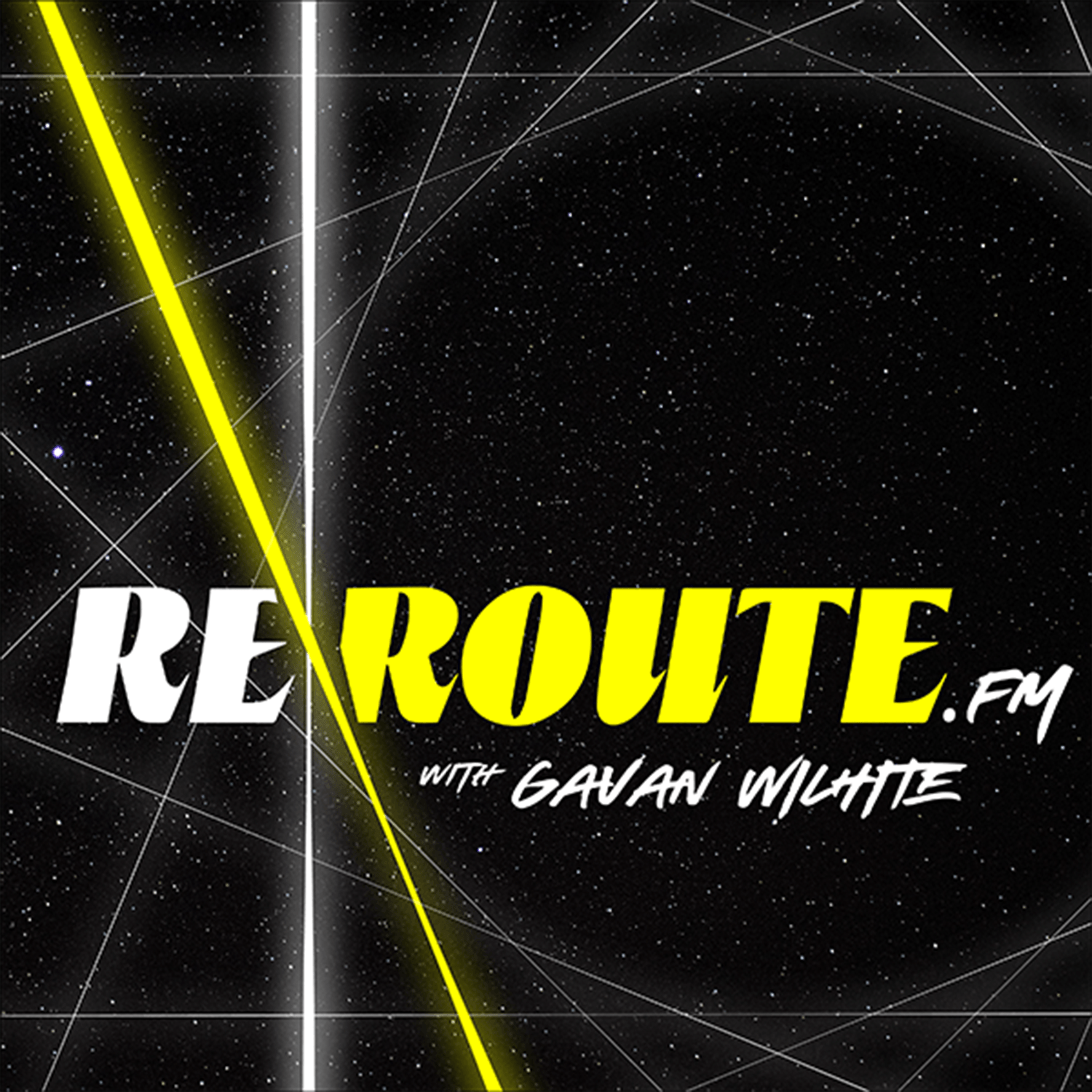Episode 2
Working Well Together
In this episode, we speak with Rich D. Bartlett. Rich is a co-founder of Loomio: a platform for small-scale digital democracy; as well as The Hum: a consultancy for improving the operations of decentralized organizations. He also is the designer behind the Microsolidarity methodology of community-building.
In this episode we’ll dive into process facilitation for decentralized organizations, methods for developing a sense of belonging, and how to create containers where people can actually change their minds. We also run our first ReRoute collaborative brainstorm for finding non-traditional forces to stay grounded to real needs as an organization.
>> Links and References <<
Transcript
00:01.80
Gavan
All right? We're back after our brainstorm. There's a lot of fun and we will give you guys just a little bit of the overview of some of the things that we came up with so as a reminder, the prompt was what type of kind of market tests or can we have that aren't traditional. Monetary systems or monetary markets. The idea being Basically how can we ensure that our organizations are performing Well if they're not being subject to existing monetary forces or if we want to have extra things and so I'll cover a couple of the topics and then I'll hand it off to rich. Um, So one of the things that we talked a little bit about our braintorned about was different competitive dynamics right? So you can have competitions between cruise inside of an organization I Also I don't know if this would make any sense but we could have you know friendly planned competitions between organizations in the same space I like having you know, friendly relations to other. People that would otherwise be competitors and it's kind of interesting to kind of have races against them. Um, yep.
00:59.18
rich
Hey yeah, he did do you know as I understand it from a sort of like evolutionary biology perspective. What makes a competition friendly is when you ah when you have a sort of a shared sense of you are all part of a bigger thing.
01:07.23
Gavan
E.
01:14.40
Gavan
Um, ah.
01:15.62
rich
You know the people the people that you're competing against are part of you. You're not out to destroy them. You also like you're in a football league or something where it's like yeah you want your team to win. But you also want to have good sportsmanship and you actually care about the other players because you're part of this bigger thing. You know that you all care about.
01:28.56
Gavan
Totally yeah and that's how you have to avoid the was old Microsoft had a lot of the pad competition between internal teams so they've since fixed that. But yeah, definitely something to keep in mind. Um and then um, you know one of the other themes that came up here was kind of. Sourcing crowd wisdom right? So um, you know whether that's sourcing goals from you know crowds or sort of communities. Um, you know prediction markets or a rich filled in quadratic voting. Do you mind telling us just a little bit about that rich.
02:00.97
rich
Yeah, this is something that's um, kind of really popular in the in the crypto web 3 space and if the concept is like we're going to have some kind of funding going on and everyone gets to vote for where the money goes.
02:07.96
Gavan
Me.
02:20.79
rich
But many small contributions so like a little bit of support from many people is worth a lot more than a lot of support from 1 person. So it's really it's a really like ah a way of like balancing the voting mechanism so that you reward large communities of support rather than wealthy people.
02:27.92
Gavan
Me.
02:36.66
Gavan
Yeah, definitely I've seen that they have like really pretty graphs where yeah, like the more you donate it kind of it caps out you get diminishing returns of how much is getting matched right? Yeah yeah, totally and then you want to speak about some of the other ones that we brainstorm drish.
02:52.16
rich
Yeah I mean the first thing that that came to mind for me was my experience and in spiral with what we call co-budgeting and this comes from ah like the old fashion way of doing it is you actually have a room you have people proposing different projects and each project has a bucket in front of them.
02:58.42
Gavan
You.
03:09.20
rich
And you give everyone monopoly money and they walk around the room hearing about the projects and they put their monopoly money you know and the projects that they they're most convinced by and this is yeah again, the good thing about the market dynamic. There is you have to choose it's this or that you have to prioritize it forces your hand.
03:14.74
Gavan
Fit.
03:25.34
rich
Where when you don't have that market dynamic. You can say oh I love all of them All of these ideas are brilliant and it and it doesn't actually help you prioritize and you can You can also extend that we haven't done this but you could easily extend that to have a a matching grant so that like you crowd source the kind of co-budgeting process.
03:28.88
Gavan
Totally that makes a lot of sense.
03:44.63
rich
And then an institutional funder comes in and doubles every dollar that was put in the bucket. For example.
03:48.33
Gavan
Yeah, that makes a lot of sense. Ah I think we had some stuff up. Yeah Quantified feedback. Yeah hit hit. Yep.
03:52.83
rich
I Mean that? yeah yeah, that gets to the next part about quantification in general and so I mean that's one of the this is the double-edged sword of the market like the the excellent thing about the market is that you you've got very precise quantified feedback. You know like did X change y.
04:10.59
Gavan
A.
04:12.59
rich
Um, but the the dark side of that is that the most important things in the world are priceless. You know you don't if you if you come to my house for dinner and we have a lovely evening and then you say here's thirty bucks you know it kind of like spoils the evening. Um.
04:17.73
Gavan
Me.
04:26.44
Gavan
Yeah.
04:30.20
rich
And so while the quantified feedback is really crucial and and we can and ah and ah, thankfully we're actually seeing a lot more of this coming online now this more like quantified self much more access to big data. Um, the ability to like track a lot of stuff and and say like this is my goal. I'm going to measure my behavior over the course of the year until they actually make that measurable improvement like that's awesome. So long as that quantitative stuff is always in service of the qualitative like what are our values. What do we actually care about and like I say the stuff we care the most about is the hardest to measure.
04:49.91
Gavan
And.
04:59.41
Gavan
Yeah, yeah, makes sense. Um, great and then I think you know we talked a little bit about um, ah, kind of. Doing retrospectives right? So I think we we had a few thoughts in from producer Nick and you know I definitely like the idea of having like kind of rigorous retrospectives. Not only sort of setting up things in the beginning but making sure that we chest those at the end. Um, and you know in particular, there's another kind of theme that pulled out of about these kind of pre-existing commitments that we're going to check in on right? So like every pre-planned metrics. Do we have kind of prizes that we're shooting for or success metrics from kind of third -party organizations um, or you know, basically just um, trying to kind of have these advance commitments. So um, thanks for doing that with me. Yeah, rich and nick and hope to do more of these because you know one of the things that we're trying to do here at rewout is hash out some solutions to go into the future. So. Ah, any any final thoughts on this rich before I move on.
06:06.89
rich
Well just I noticed in myself my like um the critical voice. You know it's like brainstorming you want to just be like yes and yes and yes and and I'm like what about this and what about that and what about that which is like phase 2 right? yeah.
06:15.50
Gavan
Ah, and of cards right? yeah. I know Well yeah, and that's you know that's that's someone just to Express is you know, take this out with a grain salt. This is top of mind brainstorming over 4 minutes, but you know what maybe somebody will pull out an idea here and tell us that it's actually a good one. So yeah.
06:33.50
rich
Yeah I hope so.
06:37.80
Gavan
Um, well you know one of the last topics I wanted to hit today was just I know you know one of the things that we both care a lot about is um, figuring out ways of navigating this increased polarization that's been happening. Um. And you know in particular both you know how we address this and I think in particular like how do we help people change their minds or feel comfortable changing their minds. I know there's been a few situations in my life where I have been felt called to do so um I think I've said it on the podcast before but you know I used to think that global warming wasn't real um and. You know, eventually just realizing that I cared a lot about science and I just kind of forced myself to read. Um, it was the royal society London put out a pamphlet and like it took me like a week of like gut-wrenching pain to be able to tell people that I changed my mind on this because I'd been on the other side for so long and so. I'm curious to just kind of open up. You know if you have an initial thoughts on this and you know we can talk through it. Yeah well you know I think there's ah, there's a lot right? So there's this kind of like um.
07:31.85
rich
Um, yeah, well tell me more about the pain like why? What's what's hard about saying oh I used to think this but no I think that.
07:49.83
Gavan
You know, especially if you're the kind of person that argues passionately right? You have brought that energy to a lot of conversations on the other side and so in order to say I have changed my mind about this. You also are and kind of implicitly apologizing for having.
07:56.25
rich
Ah.
08:08.18
Gavan
Spread misinformation or having been angry at someone for defending something that you now think is right? um and you know I see the most extreme example I see of this right now is with people kind of on their dying breaths denying that Covid is real. You know as they're literally dying from this virus right? And so.
08:23.64
rich
Me next.
08:28.20
Gavan
I Think it just points at just how powerful a psychological force. It is to to not go back on something that you fought for very hard. You know.
08:34.78
rich
You know, honestly this goes right back to the side of the conversation from my perspective like it's partly about belonging. It's like um as all of these structures for belonging are being eroded and receding in our lives we we latch onto different ways of identifying ourselves. So it's like.
08:41.89
Gavan
Me.
08:54.80
rich
Oh I'm ah I'm a I don't know anti-vaxer or I'm a flat-earther or you know like you just you you find a few beliefs and you like construct a whole identity around that and then it's like and the polarization actually feeds that identity you know like you de define I say that's like being.
08:59.53
Gavan
Right.
09:08.38
Gavan
It does.
09:11.53
rich
Being defined by negative space. It's that you're defined by what you're against while you're not and all of that pressure of people saying you're not us. You're them that actually reinforces your sense of identity and like you know what your place is. It's like it actually gives you ah an orientation point and when you Confront this thing of like wait a minute this belief that I've.
09:13.46
Gavan
Um, right.
09:30.66
rich
Attach so much value to it's not actually true. It's an identity crisis. You know it's just like well who am I Then who are my people and have I been? Ah, oh Wow I've been ah offending my people I've been doing harm. Do you know? it's like this really, there's a lot of dissonance there. Um, so it's partly about belonging I think the other dimension is that it's about domination to be frank.
09:33.75
Gavan
Yeah.
09:48.55
Gavan
E.
09:50.49
rich
It's like it's that um I call it discursive fundamentalism and I'm using that term very precisely because of my you know background in a fundamentalist community. The the discursive fundamentalism is this growing trend that I notice and the way that we have political conversations.
10:00.38
Gavan
In.
10:10.23
rich
In public spaces, especially digital spaces where I'm not seeing your face. Um is this this attitude this orientation towards a conversation which is essentially designed to demonstrate your superiority. So whether that's like a moral or an intellectual superiority to say like.
10:13.10
Gavan
E.
10:24.34
Gavan
Um, anyway.
10:29.97
rich
I am right? and by the end of this conversation. You will either agree that I'm right or else you will concede that you're like morally or intellectually inferior to me and that's just fundamentalism. You know like that's just that's just the Jihad mentality and it's increasingly common and.
10:37.35
Gavan
Ah, yeah, yeah.
10:48.80
rich
And it really takes a kind of jujitsu move to participate in a polarized dynamic where that's what's going on and to interrupt that flow and to present an alternative that's not about just dominating the dominator. You know, like that's the most natural thing is like oh I'm smarter and actually more morally superior than you I can.
11:00.37
Gavan
Right.
11:07.70
rich
Can flip you upside down and say no no, no, we want to go into a whole different plane. That's not it's it's orthogonal. You know it's not about us or them. It's like we pop through the frame into a different environment altogether and we start to do the sense making in a more generative way not defined by negative space but positive space like brainstorming right? Like oh what don't we know.
11:12.42
Gavan
Yes, exactly.
11:24.18
Gavan
Right in.
11:27.35
rich
But do you know that I don't know what's the exchange share. What's the things that we never would have thought of if we hadn't met each other and that's ah I mean honestly for me that's almost like a performance art piece or like ah a role that I'm trying to play in the public sphere is like there's a way to participate.
11:37.59
Gavan
Sure.
11:43.11
rich
Without reinforcing polarization and actually kind of tripping up the polarization every time it it shows up.
11:47.10
Gavan
Yeah, and I think that there's ways to still you know it's It's ah interesting Arcs I Still feel like there is some value in you know, making sure that people get challenged when they when they say people that you say things that you might disagree with but then very quickly afterwards or you know in that. Um.
12:04.70
rich
Ah, get I think it's I think it's very good to punch a nazi I got I've got no doubts about that you should punch a nazi. Um, you know we've got boundaries. There's a reason.
12:04.71
Gavan
I Don't know how do you feel about that because sometimes there's definitely folks who say something on the podcast I'm like I feel called to challenge this you know and there is a way that I can more both end it. But yeah, sure, Yeah yeah. Man.
12:23.67
rich
Yeah I just think about you know our granddads and stuff that were that were literally out there fighting nazis like we do need to have principles. But when I look at you know the drama that's going on on my Twitter at the moment about Jordan Peterson and
12:28.83
Gavan
Yeah.
12:38.30
Gavan
Me sure.
12:41.13
rich
Joe Rogan and these kind of characters. It's that yeah I can see why people get upset about them. But in the grand scheme of history like if you really look at what they're doing compared to what other people have done in history. It just doesn't seem to me that the harm that they're involved in is this like astronomical thing that requires us to like.
12:59.90
Gavan
Share.
12:59.96
rich
Actually punch them in the face. You know it's like a different category. It's like we've lost our sensitivity to scale and and yeah that something about the way that the conversation is happening escalates the sense of the threat out of all sorts of proportion.
13:11.93
Gavan
Yeah I hear it. Um you know So you're talking a little bit. You know when you're talking about in spirit and kind of the culture that the organization has I was reflecting a little bit on some of the communities that I'm in and kind of the norms and you know one of the ones that I. I'm kind of peripherally involved these days but was much more involved. You know a few years ago is kind of the rationalist community and one of the norms there is that you get a lot of props and like a lot of social credit for changing your mind. Um, and. It's one of these things you know one of the other cultural norms. It's kind of funny is that it's totally acceptable to say. Ah, Thank you? I'm done with this conversation I'm leaving now. So You know once you realize that then you're like okay, fine people are just going to say that to me and I won't be Upset. Um.
13:53.36
rich
Yeah, yeah.
14:02.25
Gavan
But but with the changing your mind you know I'm curious because I know that you've looked at you know, like how do you instill good culture and organizations and communities. Do you have any thoughts on like how like I don't know how that got into the rationalist community or how that was you know normalized. But do you have any thoughts on how that happens.
14:11.46
rich
Um, yeah.
14:17.43
rich
Yeah, totally and we've done some experiments with this. It's kind of spicy but it's fun to experiment with um the way that I think about it is that most of the groups that I've encountered.
14:21.47
Gavan
Yeah, sure.
14:34.54
rich
They do have some of this like I said about defining yourself by negative space. There is some kind of oppositional framing. Um, so like um I mentioned the punk subculture a lot of that is kind of like about not being the mainstream. Um.
14:36.74
Gavan
Um, of life.
14:48.66
Gavan
Yep.
14:49.81
rich
And then you know I've been in in activist groups that are like anti-capitalist or anti-pariarchal or something like that. Um, and and that's you know that oppositional framing gives you a central point of reference but it also has some real weak points and and.
14:52.98
Gavan
Sure.
15:06.60
Gavan
Yep.
15:08.30
rich
I've run processes with one of my co-facilitators before where we got together a bunch of people who are mostly activists in this case sort of like progressive activists radical activists and got them to spend some time just in reflection and then Journaling like what are some of your doubts. And misgivings about what you think the tribe believes you know what are some of the what are some of the things that people hold as and like an unassailable truth that you're actually a little bit uncertain about or what are some beliefs that you hold that you would be embarrassed to share because you'd you'd fear, there'd be some kind of negative consequence and just.
15:30.23
Gavan
Um.
15:43.61
Gavan
And.
15:46.10
rich
Just journal that for yourself, you know don't tell us but just just see if this stuff in there. Um, what are your heresies you know and everyone's got a bunch and then and then we move from the journaling exercise to well let's get get get get together in pairs or threes and share a little bit.
15:50.87
Gavan
Yeah, yeah, that's interesting.
16:05.59
rich
You don't have to share the contents of your journal but just share what is it like to even admit that you have doubts and heresies and then we moved from that smaller group to the larger group and eventually we had the whole room together with like 40 people talking about well these are all the things. These are all the ways that I doubt our orthodoxy and our fundamentalism.
16:09.96
Gavan
E.
16:23.47
Gavan
Fifth.
16:25.54
rich
And and it really softened this sense of social pressure that we've all got to think the same thing and it and it created much more space for divergence of opinion and like and that was coming after as it's towards the end of a three day event where people had a chance to like develop a lot of trust and recognition with each other and say okay.
16:44.60
Gavan
Um, you're not a nazi. Yeah yeah, it.
16:45.21
rich
You're my people I care about you you care about me and because we've got that. Trust yeah, you're not a nazi I can actually handle the fact that you think of it differently to me and it's not a threat you know.
16:55.10
Gavan
Right? right? Yeah,, that's powerful I like that you know it makes me wonder I can see that both within organizations and this this stuff sometimes is hard to. To construct. But I could imagine a tit for tat conversation with a conservative going interesting on that hey let me share something that I think is wrong with our tribe or that I'm a here to heretic on what about you.
17:12.42
rich
Yeah, yeah, yeah, um, maybe another one that's practical and and maybe a bit more straightforward to achieve is just really genuinely celebrating dissent. So like if you have ah you're in the community house.
17:26.53
Gavan
Um.
17:30.94
rich
And you've made a proposal about some kind of change and everyone likes the proposal apart from 1 person who's dissenting like it's so difficult to be that person. It's so painful and and a practice that we learned out in spiral was like if someone is in that posture of dissent if they're blocking if they're the veto someone will go and stand by them.
17:36.96
Gavan
Yep. M.
17:50.80
Gavan
Oh interesting.
17:50.62
rich
Like physically stand by them if we're if we're together. But if we're in a digital space at least like notify them like I am by your side I'm with you I'm here for you I'm listening to everything you've got to say I'm not necessarily going to agree with your perspective but I'm here to make sure that your voice is heard and that.
18:04.87
Gavan
E.
18:08.14
rich
That really de-escalates the tension. Um and and guarantees a sort of like Baseline of safety and says we actually care about dissent because it's the dissenting voices that increase the quality of our sense-making um and and if the person feels supported.
18:12.12
Gavan
That's powerful.
18:21.20
Gavan
Yep.
18:25.57
rich
Then they're much less likely to act out and be all like dramatic and much more likely to just say like this is my piece. This is what I think you know they're much more able to participate in a like peaceful process. Um and yet and if there's an advocate standing by their side. They're much more likely to be heard.
18:40.60
Gavan
Yeah, actually brings a little tear to my eye because it takes some courage to do that. So I appreciate that awesome well, you know we're getting a little bit towards the end of our time today. So. Are there any other either topics on polarization or other topics that we haven't touched on today that you want to bring up.
19:00.13
rich
Let me just another really short like practical thing on polarization. Um, everyone is in a bubble. You know that's just that. That's just how it is but it's easier than ever to pop your bubble. You just go on Twitter and you find someone that triggers you.
19:03.62
Gavan
Um, yeah I mean.
19:14.14
Gavan
And.
19:19.10
rich
And then you follow them and you follow a bunch of people that follow them and then treat it as a spiritual practice that like every time you see something that triggers you on Twitter instead of writing an angry reply you get out your journal and you say I'm feeling really intensely triggered I feel it in my guts. It's in my face. It's a 5 out of 10 it's a 10 out of 10 this is the story. This is my needs. These are my feelings. This is my values like actually journaling that out and and exposing for yourself like what is at stake here um gives you much more clarity about your values and actually takes this thing out and means you can show up to that conversation in a constructive way. You don't have to at all you don't have to participate at all. You can just. Treat it as a spiritual practice that you do on your own and say thank you very much without having to engage with them but like intentionally popping my bubble and exposing myself to many different, many many different worldviews has been destabilizing but very rewarding it's it's it's not It's not exactly fun. It's not easy.
20:09.32
Gavan
E.
20:15.33
rich
But it has really given me a kind of epistemic humility. You know like I don't I don't think that I see the world the right way anymore I think I see the world in a limited and somewhat unique and interesting way and I'm curious about all the other limited and interesting and and unique ways and how we can.
20:19.63
Gavan
Sure who.
20:34.40
rich
Patchwork those together into a collective intelligence and I honestly I credit a lot of that to just spending a lot of time on Twitter and not not trying to find all the people that agree with me.
20:42.66
Gavan
Well I definitely love the Twitter trigger exercise is a good stoic practice for myself. So I may have to try that. Well thank you so much for coming on today rich this has been enlightening and I'm glad we got to hash out some stuff together and. Wish you much success in helping us shape decentralized awesome organized future.
21:06.80
rich
Thanks! Gav I've had a lot ah lot of fun with you chairming on this. Um, maybe one last plug is just I mentioned Twitter I love twitter come and hang out with me on Twitter I'm Rich disobels. Um I don't really like emails and private messages and things. But I do like jamming with people in public if you're interested in my. Online courses gatherings trainings, blah blah blah blah blah you'll find that through my Twitter profile.
21:30.92
Gavan
That's fantastic. Thank you for sharing that with us and we'll make sure that we have some links in the show notes all right? Well you have a wonderful day and thank you again. Take care rich.
21:39.97
rich
Um, thank you.






